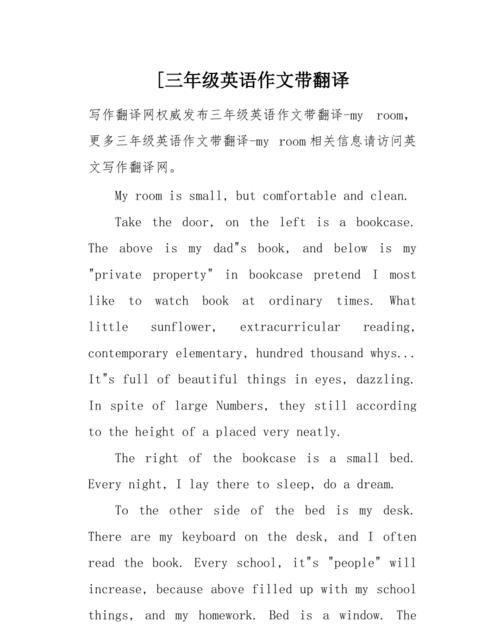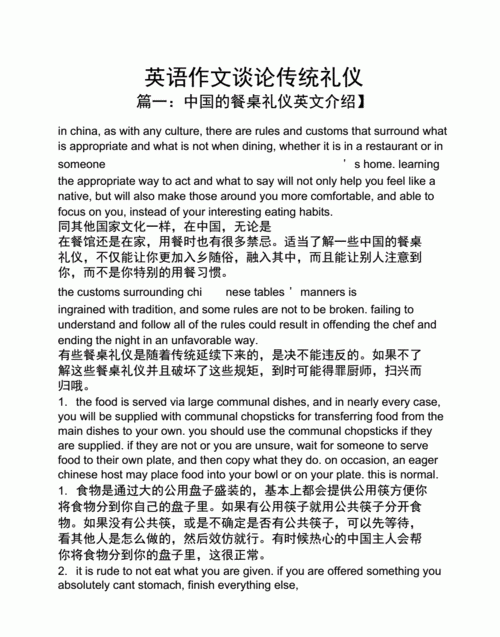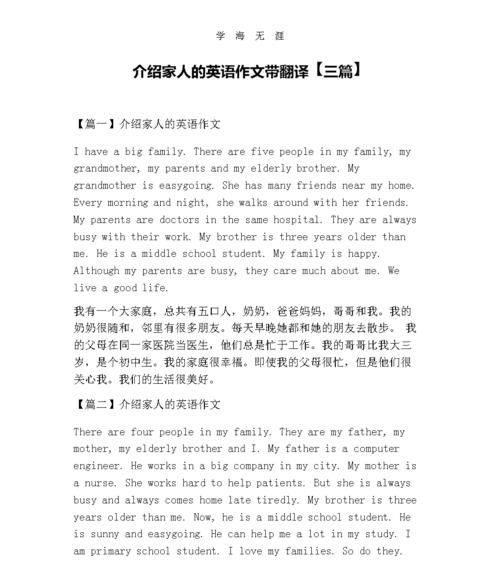本文目录
初一英语作文五十字左右
As we all know,different countries have different table manners. Today, I’d like to introduce something about Chinese table manners. It’s very necessary to learn table manners in China. In China, table manners are too much. For instance,you are not supposed to eat with knives and forks. Chinese usually use chopsticks instead. But we are not supposed to stick our chopsticks into our food. But we are supposed to pick up our bowl to eat. And we are supposed to let the old start eating first. And we are allowed to talk at the table. However, you can’t talk too loud and laugh too crazily. In fact, in China, table manners are not so serious . so , you don’t need to worry about them so much. 我们都知道,不同的国家有不同的餐桌礼仪。今天,我想向大家介绍一下中国的餐桌礼仪。这是非常必要的学习中国的餐桌礼仪。在中国,餐桌礼仪太多。例如,你不应该用刀叉吃饭。中国人通常用筷子代替。但我们不应该把我们的筷子到我们的食品。但我们应该拿起我们的碗吃。我们应该让老人先开始吃。我们可以在餐桌交谈。然而,你不能说得太大声,笑得太疯狂。事实上,在中国的餐桌礼仪,没有那么严重。所以,你不需要担心太多。

关于中国的餐桌礼仪的英语作文初二带翻译
Of course, the main difference on the Chinese dinner table is chopsticks instead of knife and fork, but that’s only superficial. Besides, in decent restaurants, you can always ask for a pair of knife and fork, if you find the chopsticks not helpful enough. The real difference is that in the West, you have your own plate of food, while in China the dishes are placed on the table and everyone shares. If you are being treated to a formal dinner and particularly if the host thinks you’re in the country for the first time, he will do the best to give you a taste of many different types of dishes.
The meal usually begins with a set of at least four cold dishes, to be followed by the main courses of hot meat and vegetable dishes. Soup then will be served (unless in Guangdong style restaurants) to be followed by staple food ranging from rice, noodles to dumplings. If you wish to have your rice to go with other dishes, you should say so in good time, for most of the Chinese choose to have the staple food at last or have none of them at all.
Perhaps one of the things that surprises a Western visitor most is that some of the Chinese hosts like to put food into the plates of their guests. In formal dinners, there are always “public” chopsticks and spoons for this purpose, but some hosts may use their own chopsticks. This is a sign of genuine friendship and politeness. It is always polite to eat the food. If you do not eat it, just leave the food in the plate.
People in China tend to over-order food, for they will find it embarrassing if all the food is consumed. When you have had enough, just say so. Or you will always overeat!

关于中国餐桌礼仪的英语作文带翻译
不清楚你的详细要求,这个是详细版本,可以自行缩减
Generally, Chinese table manners are more informal than the West, although there are more rules concerning interactions with other guests due to high levels of social interaction as a result of the communal style of serving.
Chopstick usage
Chopsticks should always be held correctly, i.e. between the thumb and first two fingers of the right hand.
When not in use, chopsticks must always be placed neatly on the table with two sticks lying tidily next to each other at both ends. Never point the chopsticks at another person. This amounts to insulting that person and is a major faux pas.
Never wave your chopsticks around as if they were an extension of your hand gestures.
Never bang chopsticks like drumsticks. This is akin to telling others at the table you are a beggar.
Never suck the chopsticks.
Decide what to pick up before reaching with chopsticks, instead of hovering them over or rummaging through dishes.
To keep chopsticks off the table, they can be rested horizontally on one's plate or bowl; a chopstick rest (commonly found in restaurants) can also be used.
When picking up a piece of food, never use the tips of your chopsticks to penetrate the food as with a fork; exceptions include tearing apart larger items such as vegetables. In more informal settings, smaller items or those more difficult to pick up such as cherry tomatoes or fishballs may be stabbed, but this is frowned upon by traditionalists.
Never stab chopsticks vertically into a bowl of rice, as this resembles incense sticks used at temples to pay respects to the deceased. This is considered the ultimate dinner table faux pas.
Communal chopsticks
When there are communal chopsticks, it is considered impolite to use your own chopsticks to pick up the food from the shared plate, or to eat using the communal chopsticks.
It is considered impolite to use the blunt end of one's own chopsticks to transfer food from a common dish to one's own plate or bowl; use the communal chopsticks instead.
When communal chopsticks are not provided, it is considered polite (and sanitary) to use the blunt end of one's own chopsticks to serve a guest by transferring food from the common dish to a guest's plate or bowl.
An exception to the above can usually be made in intimate settings such as at home.
Other utensils
If noodle soup is served, many consider a more elegant way to eat by picking the noodle into a serving spoon first, and eating from the spoon, rather than slurping directly from the bowl into the mouth using chopsticks.
Chinese traditionally eat rice from a small bowl held in the left hand, however by no means is this good etiquette. It is believed this is the way most people eat but not at all an indication of how it should be done. The rice bowl is raised to the mouth and the rice pushed into the mouth using the chopsticks. Some Chinese find it offensive to scoop rice from the bowl using a spoon. If rice is served on a plate, as is more common in the West, it is acceptable and more practical to eat it with a fork or spoon. The thumb must always be above the edge of the bowl.
Eating from common dishes
Pick the food on the dish that is at the top and nearest to you in distance. Never rummage through the dish or pick from the far side for your favorite food.
In general, more conservative Chinese frown upon the practice of picking more than one or two bites of food in your bowl or serving plate as if you were eating in the Western way. Most Chinese would understand the practice during infectious disease epidemics, or if the person is from the West.
If both a serving bowl - separate from rice bowl - and plate are provided, never put any food items to be eaten onto the serving plate. This rule may be relaxed for foreigners.
If a dish is soupy, pull the serving bowl near the serving dish and reduce the distance the chopsticks need carrying the food. Spilling plenty of sauce on the table is a major faux pas.
After you have picked up a food item, do not put it back in the dish.
Seniority and guests at the table
The elderly or guest(s) of honour are usually the first to start the meal.
The youngest or least senior may serve the eldest or most senior first, as part of the Confucian value of respecting seniors.
The youngest on the table addresses all of the elder members at the table before starting, perhaps telling them to please "eat rice" as a signal to help themselves.
The best food in a dish should be left to the elderly, children, or the guest of honour, even if they are one's favourite.
The eldest person present, or the guest of honour, is given a seat facing the door.
When the hostess says her food is not good enough, the guest must disagree and tell her it is one of the finest foods they have ever tasted.
Drinks
The host should always make sure everyone's cups are not empty for long. One should not pour for oneself, but if thirsty should first offer to pour for a neighbor. When your drink is being poured, you should say "thank you", and/or tap your index and middle finger on the table to show appreciation, especially when you are in Southern China, e.g. Guangdong Province. This action is evocative of bowing your head.
When people wish to clink drinks together in the form of a cheer, it is important to observe that younger members should clink the rim of their glass below the rim of an elder's to show respect.
Strong alcohol, called baijiu, is often served throughout the meal; and it is customary for the host[s]/hostess[es] to insist that guests drink to "show friendship." If the guests prefers not to drink, they may say, "I'm unable to drink, but thank you." [in Mandarin: "Wo bu neng he jiu, xie xie."] The host may continue to insist that the guests drink, and the guests may likewise continue to insist upon being "unable" to drink. The host's insistance is to show generosity. Therefore, refusal by the guests should be made with utmost politeness. Beware: If a guest drinks alcohol with a subordinate at the table, the guest will be expected [if not forced] to drink a glass of the same alcohol with each superior at that table, and possibly at other tables too—if the guest has not passed out yet.
Smoking
Smoking is an extremely prevalent habit in China, especially among men. During meals, the host will sometimes pass out cigarettes to all the men around the table. If a guest prefers not to smoke, she/he should politely refuse. In Mandarin, one could say, "我不抽烟,谢谢" (Wo bu chou yan, xie xie).
Business meals
During business meals, it is best not to eat to the point of satiation, as business and not food is the actual main purpose of the gathering.
Miscellaneous
In the past, some people tended to sit at least 1 metre (3 chi) from the dining table so they would not be literally rubbing elbows with other guests. Nowadays, this practice is rarely observed.
When eating food that contains bones, it is common for the bones be spat out onto the table next to one's plate. Spitting bones onto the floor is almost never acceptable.
Belching, smacking, and slurping are common.
By Western standards, the conversations during meals often are quite loud and animated.
Treatment of staff at restaurants is somewhat "rough," with waiters/waitresses often being advised by patrons to 快点 (kuai dian), which means "hurry up."
Talking with a full mouth and eating with the elbows on the table are both very common, and tasting food from a table guest's plate is also not uncommon.

介绍中国日常交谈、乘车、拍照相见礼仪受邀做客的习俗的英语作文外加翻译
The main difference between Chinese and western eating habits is that unlike the West, where everyone has their own plate of food, in China the dishes are placed on the table and everybody shares. If you are being treated by a Chinese host, be prepared for a ton of food. Chinese are very proud of their culture of cuisine and will do their best to show their hospitality. And sometimes the Chinese host use their chopsticks to put food in your bowl or plate. This is a sign of politeness. The appropriate thing to do would be to eat the whatever-it-is and say how yummy it is. If you feel uncomfortable with this, you can just say a polite thank you and leave the food there.

以上就是关于中国的礼仪英语作文带翻译 ,初一英语作文五十字左右的全部内容,以及中国的礼仪英语作文带翻译 的相关内容,希望能够帮到您。

